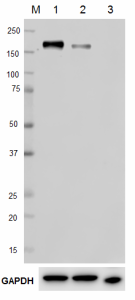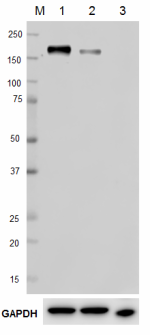- Clone
- A311F9G3E1 (See other available formats)
- Regulatory Status
- RUO
- Other Names
- MER Receptor Tyrosine Kinase, c-Mer Proto-Oncogene Tyrosine Kinase, Proto-Oncogene C-Mer, Receptor Tyrosine Kinase MerTK, STK Kinase, MER, RP38, c-Eyk, c-mer, Tyro12, MER-TK
- Isotype
- Mouse IgG1, κ
- Ave. Rating
- Submit a Review
- Product Citations
- publications

-

Total cell lysates (15 µg protein) from HepG2 (lane 1), 293E (lane 2), NIH3T3 (lane 3) cells were resolved by electrophoresis (4-20% Tris-Glycine gel), transferred to nitrocellulose, and probed with 1 µg/mL (1:500 dilution) of purified anti-MERTK (Mer) antibody (clone A311F9G3E1) (upper panel). Proteins were visualized by chemiluminescence detection using a 1:3000 diluted goat anti-mouse-IgG secondary antibody conjugated to HRP for anti-MERTK (Mer) antibody or a donkey anti-rabbit IgG antibody conjugated to HRP for GAPDH (lower panel). Lane M: Molecular weight ladder.
| Cat # | Size | Price | Quantity Check Availability | Save | ||
|---|---|---|---|---|---|---|
| 677202 | 100 µg | 249€ | ||||
MERTK is a receptor tyrosine kinase of the TAM (Tyro3, Axl, MERTK) family, which preferentially is expressed by macrophages, dendritic cells, and natural killer cells. It plays an important role in processes such as macrophage activation, apoptotic cell engulfment, platelet aggregation, and clot stability. MERTK can be activated by dimerization and autophosphorylation through ligand binding or homophilic cell-cell interaction mediated by its NCAM-like motif. The downstream signaling components include PI3 kinase, PLCγ, and MAP kinase. MERTK is upregulated in a wide variety of cancers including leukemia, non-small cell lung cancer, glioblastoma, melanoma, prostate cancer, breast cancer, colon cancer, and gastric cancer.
Product DetailsProduct Details
- Verified Reactivity
- Human
- Antibody Type
- Monoclonal
- Host Species
- Mouse
- Immunogen
- Extracellular domain of recombinant partial-length human MERTK.
- Formulation
- Phosphate-buffered solution, pH 7.2, containing 0.09% sodium azide.
- Preparation
- The antibody was purified by affinity chromatography.
- Concentration
- 0.5 mg/ml
- Storage & Handling
- The antibody solution should be stored undiluted between 2°C and 8°C.
- Application
-
WB - Quality tested
- Recommended Usage
-
Each lot of this antibody is quality control tested by Western blotting. For Western blotting, the suggested use of this reagent is 1.0 µg per ml. It is recommended that the reagent be titrated for optimal performance for each application.
- Application References
-
- Graham DK, et al. 2006. Clin. Cancer Res. 9:2662.
- Sather S, et al. 2007. Blood 109:1026.
- RRID
-
AB_2565900 (BioLegend Cat. No. 677202)
Antigen Details
- Structure
- 999 amino acids with a predicted molecular weight of approximately 110 kD with the characteristic of the common NCAM (neural adhesion molecule)-related extracellular domain. Observed molecular weight is 140-160 kD due to different glycosylation patterns.
- Distribution
-
Transmembrane protein. Preferentially expressed by macrophages, dendritic cells, natural killer cells, osteoclasts, Sertoli cells, and retinal pigmental epithelium cells.
- Function
- Macrophage activation, apoptotic cell engulfment, platelet aggregation, and clot stability.
- Interaction
- TNK2, LGALS3, TUB, TULP1, GAS6, and VAV1.
- Cell Type
- Dendritic cells
- Biology Area
- Cell Biology, Costimulatory Molecules, Immunology, Innate Immunity, Neuroscience, Neuroscience Cell Markers, Signal Transduction
- Antigen References
-
1. Pierce AM, et al. 2014. Brain Res. 1542:206.
2. Cummings CT, et al. 2013. Clin. Cancer Res. 19:5275.
3. Nguyen KQ, et al. 2013. Autoimmunity 46:294.
4. Qingxian L, et al. 2010. Front Biol. 5:227.
5. Linger RM, et al. 2008. Adv. Cancer Res. 100:35.
6. Lemke G, et al. 2008. Nat. Rev. Immunol. 8:327.
7. Graham DK, et al. 2006. Clin. Cancer Res. 9:2662.
8. Sather S, et al. 2007. Blood 109:1026. - Gene ID
- 10461 View all products for this Gene ID
- UniProt
- View information about MERTK on UniProt.org
Related Pages & Pathways
Pages
Related FAQs
Other Formats
View All MERTK Reagents Request Custom Conjugation| Description | Clone | Applications |
|---|---|---|
| Purified anti-MERTK (Mer) | A311F9G3E1 | WB |
Compare Data Across All Formats
This data display is provided for general comparisons between formats.
Your actual data may vary due to variations in samples, target cells, instruments and their settings, staining conditions, and other factors.
If you need assistance with selecting the best format contact our expert technical support team.
-
Purified anti-MERTK (Mer)

Total cell lysates (15 µg protein) from HepG2 (lane 1), 293E...
 Login / Register
Login / Register 







Follow Us